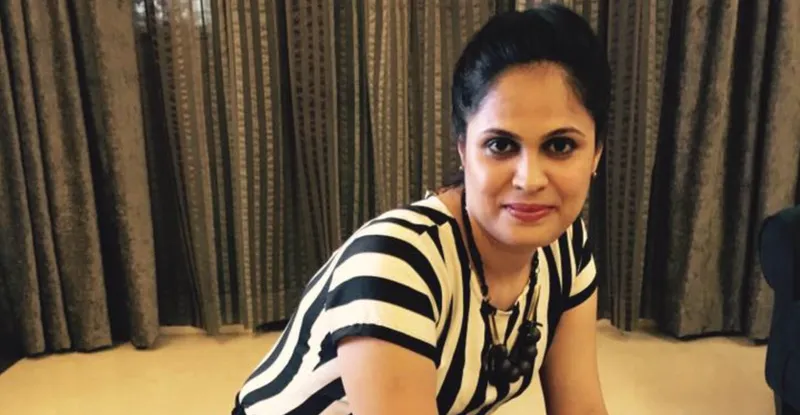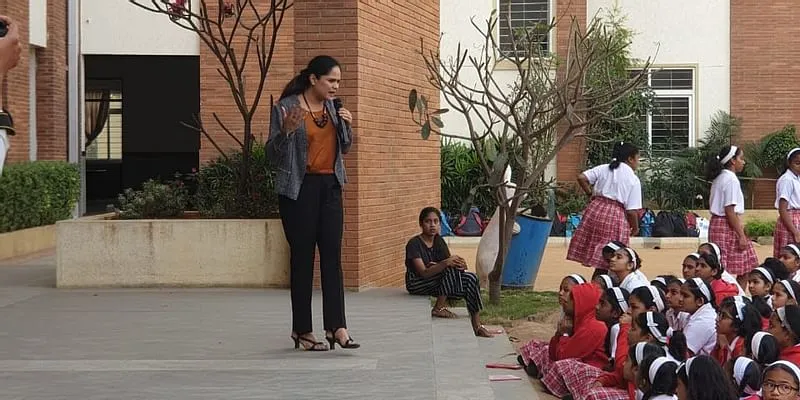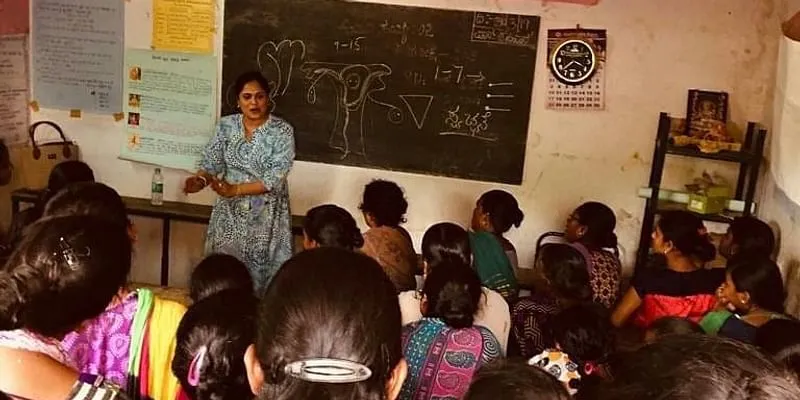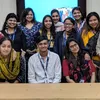This former air hostess is giving back to society by teaching disadvantaged rural women menstrual hygiene facts
Sakriya is an initiative started by former air hostess Anitha Rao to create more awareness about menstruation and remove the taboos around it. She has reached out to more than 10,000 women through her sessions.
Anitha Rao, a well travelled air hostess, has been visiting villages around Karnataka to meet underprivileged women and create awareness about menstruation. In one of the villages, she met a 60-year-old woman who claimed that she was still menstruating as she was bleeding.
Anitha, who knew it couldn’t be possible, asked the Asha workers why they hadn’t explained anything to the lady. About 15 days later, Anitha returned to the village with sarees, fruits, eatables, slippers and even adult diapers for the woman, only to learn that the woman was no more. She had died of stage IV cervical cancer.
Menstruation is still a taboo subject across India. Be it the rituals associated with it or simply the unavailability of pads for the poor, women face a slew of problems when it comes to that time of the month.
According to a 2014 report by the NGO Dasra, nearly 23 million girls drop out of school annually due to lack of proper menstrual hygiene management facilities like availability of sanitary napkins and logical awareness of menstruation.
The study further revealed that within the sample, about 70 percent of mothers with menstruating daughters considered menstruation to be dirty, and 71 percent adolescent girls remained unaware of menstruation till menarche.

Anitha Rao
With such shocking statistics as a trigger, Anitha decided to lay the foundation to her efforts and started the NGO Sakriya in 2017. Sakriya has two meanings – ‘active participation’ and ‘good deed’.
Through Sakriya, she reaches out to underprivileged women and children in Bangalore and remote villages across Karnataka and conducts awareness campaigns on menstrual hygiene and regularly distributes sanitary kits paid for from her own pocket.
Apart from this, she also takes menstrual health and personal growth sessions for corporates. Altogether, including the villages, she has conducted more than 119 awareness campaigns and events benefitting more than 10,000 women.
Becoming a social worker
Coming from a traditional family, Anitha had to fight her way to become an air hostess. She has travelled to more than 63 countries as part of her job.
“At the age of 19, I had experienced a lot of luxury, staying in expensive hotels, spending lots of money. But something kept pricking my conscience and I knew that I had to give back to the society,” Anitha tells SocialStory.

A session with the students of Sacred Hearts Girls' High School
During her interactions with poor women on the streets, she realised that they lacked awareness on the most basic things like menstrual hygiene.
Be it the significance of the colour of menstrual blood, or the timeliness of changing pads, these women were simply unaware. That’s when the idea of Sakriya came to her mind. Through Sakriya, she has covered places including Bangalore, Kolar, Belur, Vijayapura, Narsapura, and others.
Sakriya
Anitha says, “I think personal grooming can build one’s confidence and go a long way in how women perceive themselves. That’s why I make it a point to reach out to these women. I believe that your appearance is an asset,” says Anitha.
Not just in rural areas, Anitha also visits corporates and fashion industries to generate more awareness about these aspects. Some of the subjects that she tackles are personal hygiene, dental hygiene, the importance of dressing up, etc.

Menstrual hygiene session at a government school in Narsapura
During a visit to one of the government schools in Bangalore to conduct a menstrual awareness campaign, she realised that the teachers there were struggling to communicate in English.
“I approached the principal and told him that I wanted to help the students with English language. So, I go a week before any exam or test and teach whatever I can in my capacity,” says Anitha.
In addition to education and awareness, Anitha has also organised events like educational competitions and fashion shows for children with disabilities to showcase their talents to the society.
The impact
Anitha shared some of the heart-breaking stories with us that she had come across during her visits to rural areas.
Talking about grave circumstances, she says a number of women in the villages did not even own a pair of underwear. Some of the women used ropes, dry leaves, plain cloths, which led to a number diseases like Urinary Tract Infection (UTI), infertility, ovarian and cervical cancer.
“I make it a point to buy disposable underwear for these women during every visit. But what’s worse is the lack of awareness of these health products in all the remote places of the country,” says Anitha.
Anitha has not raised any investment to help her with her mission, but she is now looking for help in terms of funding, as most of her efforts are bootstrapped.
Social distancing with COVID-19
Besides distributing sanitary pads to the poor during the pandemic, she is actively conducting online sessions on menstrual hygiene management in rural areas in North Karnataka.
“While most people are under the assumption that they have network issues, the places where I reached out, most of them have good digital access. Every 20 houses there is one television and about two computers. So most of them gather around one system and join these sessions,” she shares.
During the pandemic, most of them explained that they weren’t able to access pads. So, Anitha recommended the women to use a clean cloth and wash it frequently. While the migrant workers did struggle with inaccessible pads, the rural people were in a much better position, says Anitha.
“In fact, they didn’t even allow me to go to their villages during the pandemic in order to maintain social distancing,” she adds.
Road ahead
While awareness is important, Anitha also wants to focus on building sustainability in menstrual products. She wants to encourage the use of menstrual cups, reusable pads and biodegradable pads. This initiative is called Sakriya Period Paat Abhiyaan.
“The impact of plastic on the aquatic ecosystem is quite detrimental, and taking this small step can inspire more of such activities. Also, I want to make at least one village free of plastics pads.”
She is already working on this project in Narsapura which has a very small number of families. The women spread the word about reusable products which helps more people understand this concept.
Edited by Anju Narayanan









